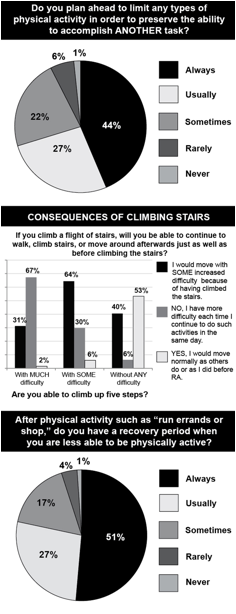Session Information
Session Type: Abstract Submissions (ACR)
Patient Survey Regarding Utility of the Health Assessment Questionnaire Reveals an Unrecognized Aspect of Disease Activity in Rheumatoid Arthritis: Consequences of Physical Activity
Background/Purpose: The Health Assessment Questionnaire (HAQ) has been used to assess disability in people with rheumatoid arthritis (RA) for over 30 years. However, the HAQ may not measure essential aspects of disease impact on ability to perform tasks because it does not consider real world context or consequences of performing particular tasks. The purpose of this study was to examine whether typical HAQ questions may miss fundamental information about functional status.
Methods: A web-based questionnaire was presented over 11 days in 2012 on a secure survey system preventing multiple entries. The questionnaire included 8 questions about consequences of performing certain physical tasks and whether a recovery period followed, and some questions directly from the HAQ. Analysis methods included reporting percentages, Pearson correlations and two-sample tests.
Results: The questionnaire was completed by 2,179 patients with self-reported RA (1997 women and 182 men; 72% seropositive) and a wide range of disease duration (< 2 years: 26%, 2-5 years: 29%, 5-10 years: 18% and >10 years: 26%). Of these, 71% reported often (44% “always” and 27% “usually”) planning ahead to limit physical activities to preserve the ability to accomplish another task. Also 78% reported often (51% “always” and 27% “usually”) having a recovery period when they are less able to be physically active after physical activity. The majority reported being unable to do chores such as vacuuming or yard work on the same day as running errands or shopping (24% “never”, 33% “rarely”, 28% “sometimes”, 9% “usually” and 6% “always”). Comparing men and women, there were no significant differences in the responses to the consequence questions (p=0.3), but for the HAQ items men had significantly higher disease activity (p<0.001). Conversely, seropositive patients had higher levels of activity on the consequence questions than seronegative patients (p=0.027), but no differences in the HAQ items (p=0.5). The questions regarding consequences of physical activities for patients with RA were only moderately correlated with standard HAQ questions regarding shampooing and step climbing (correlation coefficients: 0.3-0.4; p<0.01), indicating these questions may be measuring similar but different aspects of RA disease activity than the HAQ.
Conclusion: Within the context of real-life, patients have lower functional capacity after performing tasks described in the HAQ, and may not be able to repeat such tasks with the same level of difficulty. Patients also modify tasks, which may not be detected by HAQ responses. Further investigation is needed to develop ways patient outcome measures can more accurately assess RA disease activity.
Disclosure:
K. O. Young,
None;
D. M. Symons,
None;
A. T. Lumpe,
None;
C. S. Crowson,
None.
« Back to 2013 ACR/ARHP Annual Meeting
ACR Meeting Abstracts - https://acrabstracts.org/abstract/patient-survey-regarding-utility-of-the-health-assessment-questionnaire-reveals-an-unrecognized-aspect-of-disease-activity-in-rheumatoid-arthritis-consequences-of-physical-activity/

